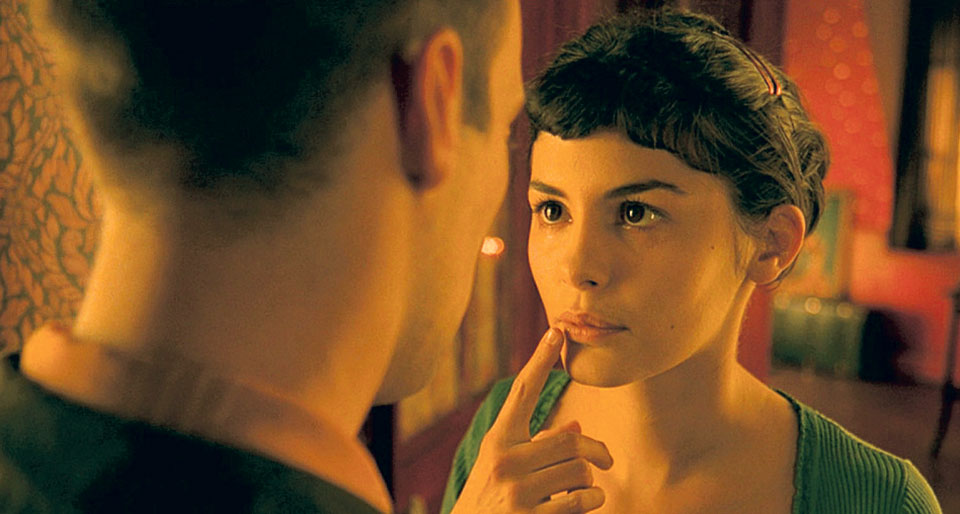
OR

Amélie is a 2001 film that the world knows of as that one “French film” everyone has probably watched at some point in his/her life. Its main characteristic is that it’s so undeniably French (for better or for worse). It was directed by Jean-Pierre Jeunet and the film stars the beautiful Audrey Tautou as Amelie, a kind hearted but a lonely woman living in the late 90s Paris, trying to sort through her life as well as of those around her.
The film is a light-hearted story about Paris and its people and it’s simply a fun watch. Personally, I loved the artistic montages throughout the film. Whenever the film introduced a character, it zoomed in on their likes and dislikes as well as their simple pleasures and that was an absolute refresher. And so the film is nothing without the people in it.
The attention to details is phenomenal in the film, from the elaborate cigarette counter, the pretty glasses to serve all kinds of wine to the zoom-in on the food, it makes you want to be reborn in Paris because things just seem extra aesthetic there. The entire setting of the film has a vintage and a bohemian feel to it that borders between artistic and artsy at times (mostly artistic though).
The film has been criticized for solidifying French stereotypes, a French journalist calling it “a demagogic retro postcard of France, undeniably cleansed of cultural diversity”. Personally, I feel like that is a little bit of an overstretch but I could see how the film could be considered as dramatizing French people a little too much, making people outside France feel like all French collect thrown out photos from below a photo booth and record every weird laugh they have ever heard on a recorder (a guy actually does this in the film). The French are just people and Paris is much more diverse in real life.
Every little movement in the film has an extra layer of drama to it. The entire film feels like a parallel universe where things are just simply extra (a universe where piano might as well actually play in the background as you meet a person you like). This trait works for the most parts of the film but at times it tends to get too slow, and you want the pace of the film to be faster.
Minus all the colors and music in the film, what you are left with is a story about a lonely woman trying to find companionship and this is the part I found to be most real. Amelie, who lost her mother as a child and had to live with her father, a distant war veteran, has always longed for love and companionship.
At the start of the film, she finds a time capsule left by a young boy (a few decades ago) in her bathroom and makes it her mission to return it to the owner who has now become a lonely 50-year-old man. After seeing the man be overwhelmed with emotion upon finding the capsule, she decides to help people find happiness in their lives, not realizing that she is doing all this to mask her own loneliness and as a desperate measure to find meaning and love in her life.
While going about her “mission”, she makes friends with an old reclusive painter who understands her loneliness and persuades her to go after a boy that she likes. By then, however, she has given up the thought of finding someone and finds pleasure in the smaller things in life, like breaking a crème brûlée with a spoon (could things get any more French?), dipping her hand in a bag of grains, and what not.
Her interaction with the painter is the only time we see her talk about her loneliness and how much she wants to find someone she can relate to. And the guy she likes, Nino, is a perfect match for her. Although he does spend half of the film following clues left by Amelie (as she is too shy to meet him in person), they bond over their search for a man in a particular photograph. Nino too is lonely but equally eccentric like Amelie and is more concerned with the little things in life like taking photos of cemented footprints than say, landing a job that pays a lot of money.
Overall, the story is about two misfits who are sometimes cute and sometimes problematic – Amelie repeatedly breaks into people’s house (last time I checked, that’s still a crime) and basically stalks Nino. But, in the end, you hope for good things for them both. Another thing I noticed is that both Amelie and Nino have way too much free time on their hands for two adults who have to pay the bills in Paris. That’s a little unrealistic and takes away from the film.
However, the overall vibe of the film is fresh and light. It’s funny, cute and warm and a delightful watch. It may not have a profound meaning or break cinematic barriers but thanks to its quirky story telling (albeit a little too quirky for real life), it will enthrall you and keep you glued to the screen.
You May Like This

4 ways to be a good traveler in the age of overtourism
May 31: In Paris, the Louvre Museum closed for a day this week because workers said the crowds were too... Read More...

Notorious gangster escapes Paris prison by helicopter
July 2: In a scene straight from the movies, notorious gangster Redoine Faid has escaped from a Paris prison by... Read More...

Qatar Airways Premium Lounge at Paris airport
KATHMANDU, Jan 18: Qatar Airways has officially opened the new Qatar Airways Premium Lounge at Paris-Charles de Gaulle Airport. ... Read More...

Just In
- World Malaria Day: Foreign returnees more susceptible to the vector-borne disease
- MoEST seeks EC’s help in identifying teachers linked to political parties
- 70 community and national forests affected by fire in Parbat till Wednesday
- NEPSE loses 3.24 points, while daily turnover inclines to Rs 2.36 billion
- Pak Embassy awards scholarships to 180 Nepali students
- President Paudel approves mobilization of army personnel for by-elections security
- Bhajang and Ilam by-elections: 69 polling stations classified as ‘highly sensitive’
- Karnali CM Kandel secures vote of confidence


















Leave A Comment